Sample Letter of Employment Verification: Best Practices and Guide

Introduction and Overview of Employment Verification Letters
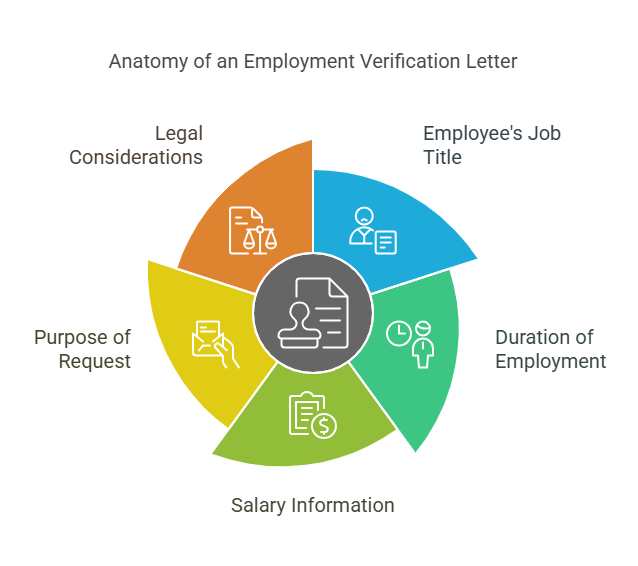
An employment verification letter is an official document provided by an employer to confirm an individual’s employment status. This letter serves as a written confirmation that a person is currently employed, has been employed in the past, or holds a specific job title within the company. Employment verification letters are used in various scenarios, such as applying for a loan, renting an apartment, or meeting immigration requirements.
The letter typically includes important details about the employee’s job, such as their job title, duration of employment, and salary. Employers may also provide additional information depending on the purpose of the request and any legal considerations.
Why Employment Verification Letters are Important
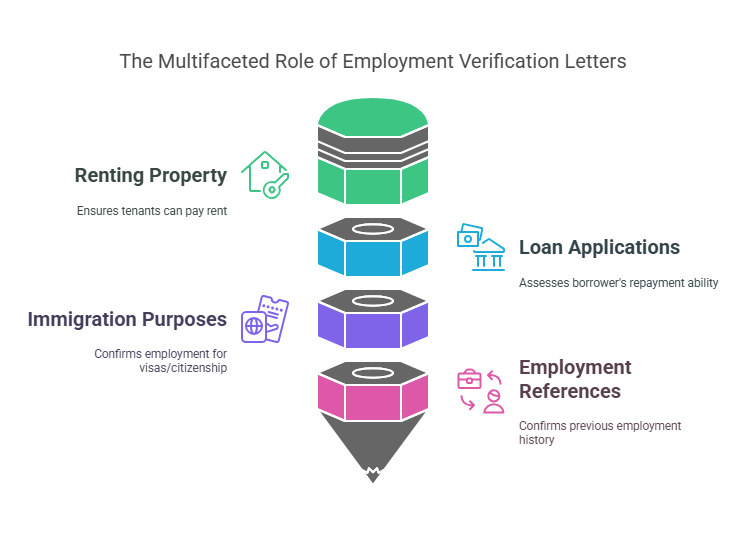
These letters are vital in many circumstances:
- Renting Property: Landlords often require verification letters to ensure that potential tenants can pay rent. The letter confirms that the individual has a steady income and is employed.
- Loan Applications: Financial institutions use employment verification letters to assess the applicant’s ability to repay a loan. This letter assures the lender that the borrower has a reliable source of income.
- Immigration Purposes: Immigration authorities might require a verification letter to confirm the employment status of individuals seeking visas or applying for citizenship.
- Employment References: Some employers request verification letters when an employee is applying for a new job, as these letters confirm the individual’s previous employment history.
Employers typically provide employment verification letters when requested by employees, prospective employers, landlords, or government agencies. However, these letters should be issued with care, considering privacy concerns and legal obligations.
The General Purpose of Employment Verification Letters
The core purpose of an employment verification letter is to provide proof of employment. Depending on the request, these letters may need to confirm:
- Job Title: The position the employee holds or held.
- Employment Dates: The start date and, if applicable, the end date of employment.
- Salary Information: The employee’s salary or hourly wage, or compensation details.
- Employment Status: Whether the employee is full-time, part-time, contract, or temporary.
- Job Responsibilities (optional): A brief outline of the employee’s role within the company.
Sample Letter of Employment Verification
Here’s an example of a typical employment verification letter:
[Your Company’s Letterhead]
[Date]
[Recipient Name]
[Recipient Title]
[Company Name]
[Address]
[City, State, ZIP Code]
Dear [Recipient Name],
This letter is to confirm the employment of [Employee’s Full Name], who has been employed with [Company Name] since [Start Date]. [Employee’s Name] is currently employed as a [Job Title], and their role is full-time.
As of [Date], [Employee’s Name] earns an annual salary of [Salary Amount] or an hourly wage of [Hourly Wage] (as applicable). Their job responsibilities include [brief description of job responsibilities, if applicable].
Please let us know if you require any further information. You can reach me directly at [Your Phone Number] or [Your Email Address].
Sincerely,
[Your Full Name]
[Your Job Title]
[Company Name]
[Company Address]
[City, State, ZIP Code]
[Phone Number]
[Email Address]
This is a straightforward employment verification letter that includes key details an employer may need to confirm for the recipient.
Key Information to Include in an Employment Verification Letter
When writing an employment verification letter, certain details should always be included:
- Employer’s Contact Information: The company’s name, address, phone number, and email.
- Employee’s Details: Full name, job title, employment dates (start and end dates, if applicable), and salary (or wage).
- Verification Statement: Clear confirmation of the employee’s job status and the purpose of the letter (e.g., confirming full-time employment, salary verification).
- Additional Information: This may include a description of the employee’s job responsibilities, or any other relevant details depending on the purpose of the verification.
- Contact Information: It’s crucial to provide a contact number and email address for follow-up if more information is needed.
Best Practices for Writing an Employment Verification Letter
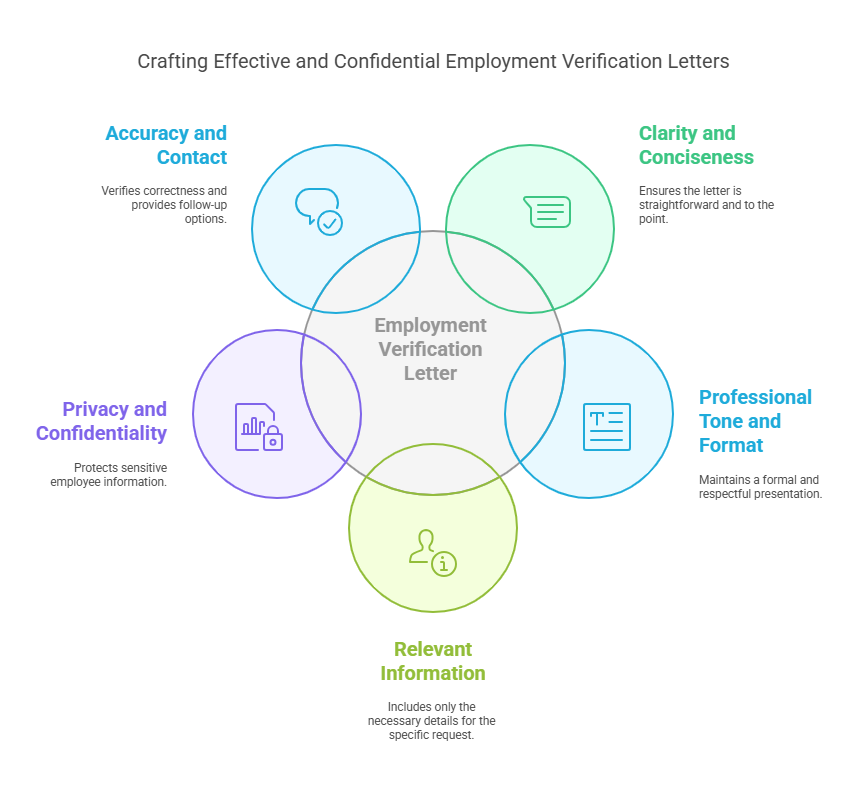
Writing an effective employment verification letter requires attention to detail, professionalism, and clarity. Below are some best practices that will help ensure the letter is both accurate and appropriate for its intended use:
1. Be Clear and Concise
When drafting an employment verification letter, clarity is essential. The letter should be straightforward and to the point, avoiding unnecessary details. Ensure the letter provides the key information that the recipient requires, such as the employee’s job title, dates of employment, and salary, without overwhelming them with extraneous details.
2. Use Professional Tone and Format
Since this is an official document, the tone of the letter should remain formal and professional. Avoid using casual language or abbreviations. Additionally, the letter should be properly formatted, following a standard business letter structure, including the employer’s contact information, date, salutation, body, and signature. This ensures that the letter is taken seriously and reflects well on the company.
3. Include Relevant Information Only
Focus on the specific information that the recipient requires. For instance, if the request is for a loan application, the lender may only need details regarding the employee’s job title and income. If the request pertains to a rental application, the landlord may also be interested in the employee’s job stability and employment dates. Be sure to provide the necessary details without overloading the recipient with irrelevant information.
4. Maintain Privacy and Confidentiality
When providing an employment verification letter, always keep confidentiality in mind. Sensitive information, such as the employee’s salary or specific job duties, should only be disclosed when necessary. Employers should also ensure that they have the employee’s consent before including personal information in the letter.
5. Double-Check the Information
Before sending the letter, carefully review it for accuracy. Ensure that all dates, salary figures, and job titles are correct. Mistakes in the letter could cause confusion or delays, and in some cases, may even result in legal repercussions for the employer. It’s always a good practice to verify the details with the employee before issuing the letter.
6. Offer Contact Information for Follow-up
Always provide a clear way for the recipient to contact you if further verification is needed. This could be a phone number or an email address. This additional step ensures transparency and allows for a smoother verification process.
Common Mistakes to Avoid
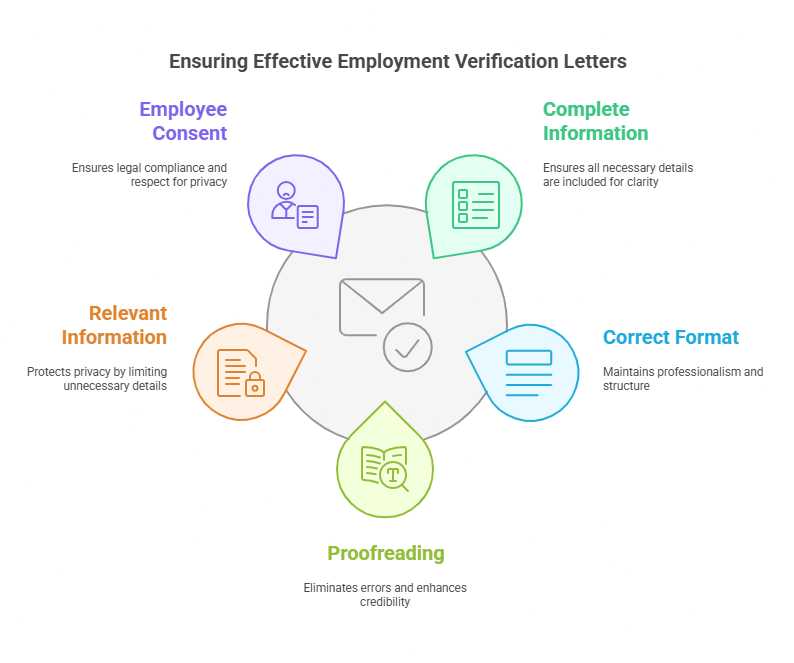
While writing an employment verification letter, it’s important to avoid common mistakes that could undermine the letter’s effectiveness or cause confusion. Here are a few to keep in mind:
1. Incomplete or Vague Information
Providing incomplete or ambiguous details, such as failing to specify the employee’s job title or leaving out the dates of employment, could render the letter useless. Ensure that the letter is as specific as necessary to fulfill the purpose of the request.
2. Not Using the Correct Format
Failure to use the correct letter format can make the document appear unprofessional and may lead to delays in processing the verification request. Stick to the proper format by including all necessary sections (e.g., sender’s contact info, date, recipient’s name, etc.).
3. Failing to Proofread
Typos, grammatical errors, and incorrect facts can create doubt about the credibility of the verification letter. Always proofread the letter to ensure there are no errors in the text. Consider having another colleague or supervisor review the letter before sending it.
4. Sharing Unnecessary Information
Disclosing more information than necessary, such as personal details that the recipient didn’t ask for, could lead to privacy concerns. Stick to the information requested, and avoid disclosing additional details unless absolutely necessary.
5. Ignoring Employee Consent
Before sharing any sensitive information, ensure that the employee has provided explicit consent. Sharing employment details without consent could violate privacy laws or result in legal complications.
Our Services: How We Assist with Employment Verification
At ExactBackgroundChecks.com, we specialize in providing comprehensive employment verification services. We assist both employers and employees with ensuring that employment history and background checks are conducted accurately and professionally. Our services include:
1. Efficient Employment Verification
We streamline the employment verification process, ensuring that both employers and employees receive accurate and timely information. We can help employers issue verification letters quickly, while also safeguarding the privacy and confidentiality of employees.
2. Customized Verification Letters
Our team can assist employers in drafting customized employment verification letters that meet the specific needs of the recipient. Whether the letter is for a loan application, rental agreement, or immigration purposes, we ensure the letter is clear, concise, and professional.
3. Legal Compliance and Privacy Protection
We understand the importance of legal compliance and adhere to all federal and state laws governing employment verification. Our services are designed to protect both the employer’s and employee’s privacy, ensuring that no sensitive information is disclosed without consent. We follow strict protocols to protect personal data and ensure compliance with regulations such as the Fair Credit Reporting Act (FCRA).
4. Comprehensive Background Check Services
In addition to employment verification, we offer complete background check services, including criminal history checks, education verification, and more. Our comprehensive approach helps employers make informed decisions while maintaining transparency and fairness in their hiring processes.
5. 24/7 Customer Support
Our team is available around the clock to assist with any questions or concerns related to employment verification or background checks. We provide support to ensure that both employers and employees have access to the information they need at every step of the process.
By choosing ExactBackgroundChecks.com, employers and individuals can trust that their employment verification needs will be met with professionalism, accuracy, and efficiency.
Legal Considerations When Providing Employment Verification Letters
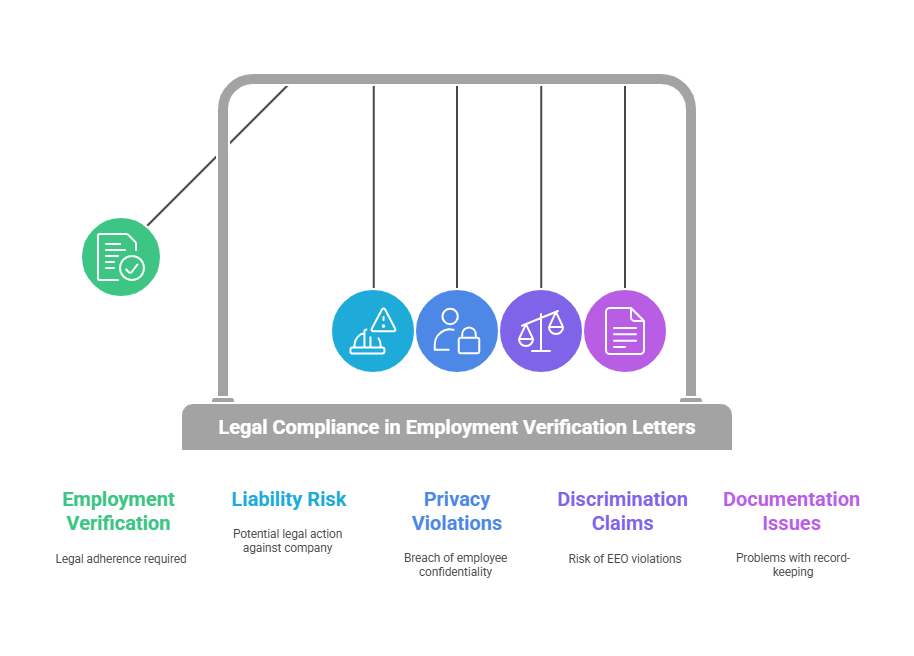
While employment verification letters are important tools in confirming an employee’s job status, employers must be mindful of several legal considerations when issuing these letters. Failing to comply with federal, state, or local laws can expose the company to liability or legal action. Below are the key legal aspects to consider when providing employment verification:
1. Compliance with the Fair Credit Reporting Act (FCRA)
The Fair Credit Reporting Act (FCRA) is a federal law that regulates the collection, dissemination, and use of consumer information, including employment verification. If the employment verification letter is part of a broader background check (such as verifying the applicant’s employment history during a hiring process), employers must comply with the FCRA’s requirements.
The FCRA mandates that the employee or job candidate must give explicit consent before a background check or employment verification is conducted. Employers must also ensure that the information provided is accurate and that employees are informed of their rights under the FCRA.
2. Privacy Laws and Employee Consent
Employees’ personal information, such as their salary or job title, is considered sensitive. Employers must always obtain consent before disclosing such details to third parties, including landlords, lenders, or other organizations requesting employment verification. Sharing information without consent could violate privacy laws or even lead to legal disputes.
3. State-Specific Regulations
In addition to federal laws, individual states may have their own regulations regarding employment verification. For example, some states have strict laws on what information can or cannot be disclosed in a verification letter. Employers should familiarize themselves with their state’s specific laws to ensure compliance when issuing employment verification letters.
4. Equal Employment Opportunity (EEO) Compliance
Employers must also be aware of Equal Employment Opportunity (EEO) laws when issuing employment verification letters. These laws are designed to prevent discrimination based on race, gender, age, or other protected characteristics. For example, an employer cannot use an employment verification letter as a means of indirectly revealing protected characteristics that might influence hiring or housing decisions.
5. Record-Keeping and Documentation
Employers should maintain records of employment verification requests and the information provided in response. This is especially important in cases where the employee’s consent is required before issuing the letter. Proper documentation helps protect the company in case of disputes or legal inquiries related to the information provided.
Frequently Asked Questions (FAQs) About Employment Verification Letters
What is an employment verification letter?
It's an official document from an employer confirming an individual's employment status, including job title, dates of employment, and salary.
Why are employment verification letters important?
They are crucial for renting property, loan applications, immigration purposes, and employment references, providing proof of employment and income.
What key information should be included in an employment verification letter?
The letter should include the employer's contact information, employee's details (full name, job title, employment dates, salary), a verification statement, any additional relevant information, and contact information for follow-up.
What are some best practices for writing an employment verification letter?
Be clear and concise, use a professional tone and format, include relevant information only, maintain privacy and confidentiality, double-check the information, and offer contact information for follow-up.
What legal considerations should employers keep in mind when providing employment verification letters?
Employers must comply with the Fair Credit Reporting Act (FCRA), privacy laws, state-specific regulations, Equal Employment Opportunity (EEO) compliance, and maintain proper record-keeping and documentation.
What is an employment verification letter?
It's an official document from an employer confirming an individual's employment status, including job title, dates of employment, and salary.
Why are employment verification letters important?
They are crucial for renting property, loan applications, immigration purposes, and employment references, providing proof of employment and income.
What key information should be included in an employment verification letter?
The letter should include the employer's contact information, employee's details (full name, job title, employment dates, salary), a verification statement, any additional relevant information, and contact information for follow-up.
What are some best practices for writing an employment verification letter?
Be clear and concise, use a professional tone and format, include relevant information only, maintain privacy and confidentiality, double-check the information, and offer contact information for follow-up.
What legal considerations should employers keep in mind when providing employment verification letters?
Employers must comply with the Fair Credit Reporting Act (FCRA), privacy laws, state-specific regulations, Equal Employment Opportunity (EEO) compliance, and maintain proper record-keeping and documentation.
Conclusion
Employment verification letters are essential documents that serve various purposes, including confirming an individual’s employment status, supporting loan or rental applications, and meeting immigration requirements. Crafting a well-structured and accurate employment verification letter is crucial for maintaining professionalism and ensuring compliance with legal and privacy regulations.
When writing an employment verification letter, it is essential to be clear, concise, and mindful of legal requirements, such as obtaining employee consent and adhering to federal and state privacy laws. By following best practices and avoiding common mistakes, employers can ensure that the letter serves its intended purpose without causing confusion or legal complications.
At ExactBackgroundChecks we provide comprehensive services for businesses and individuals seeking employment verification assistance. Whether you need to verify employment for a potential hire, fulfill a tenant request, or comply with legal requirements, our team ensures that the process is smooth, accurate, and compliant with all regulations.



